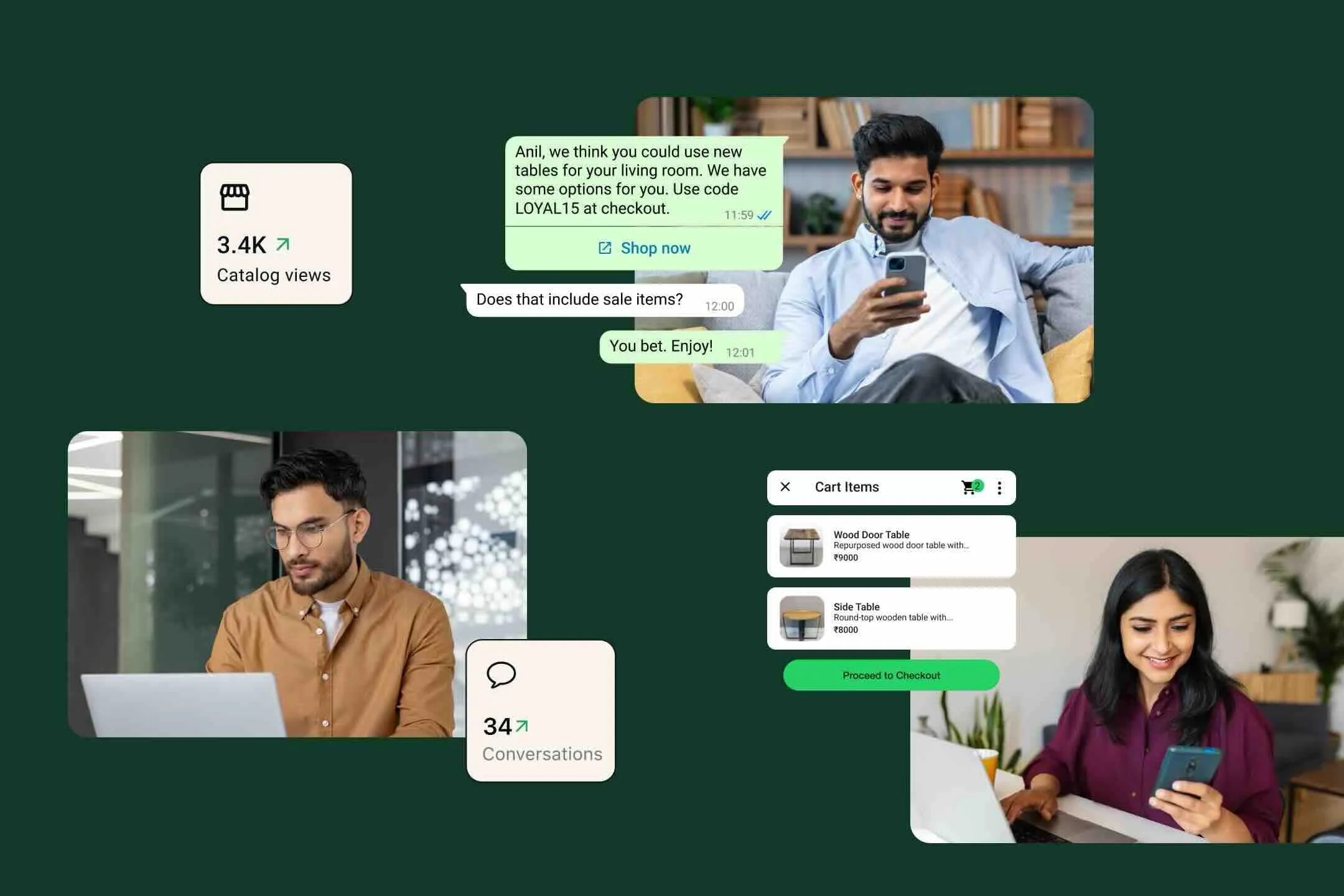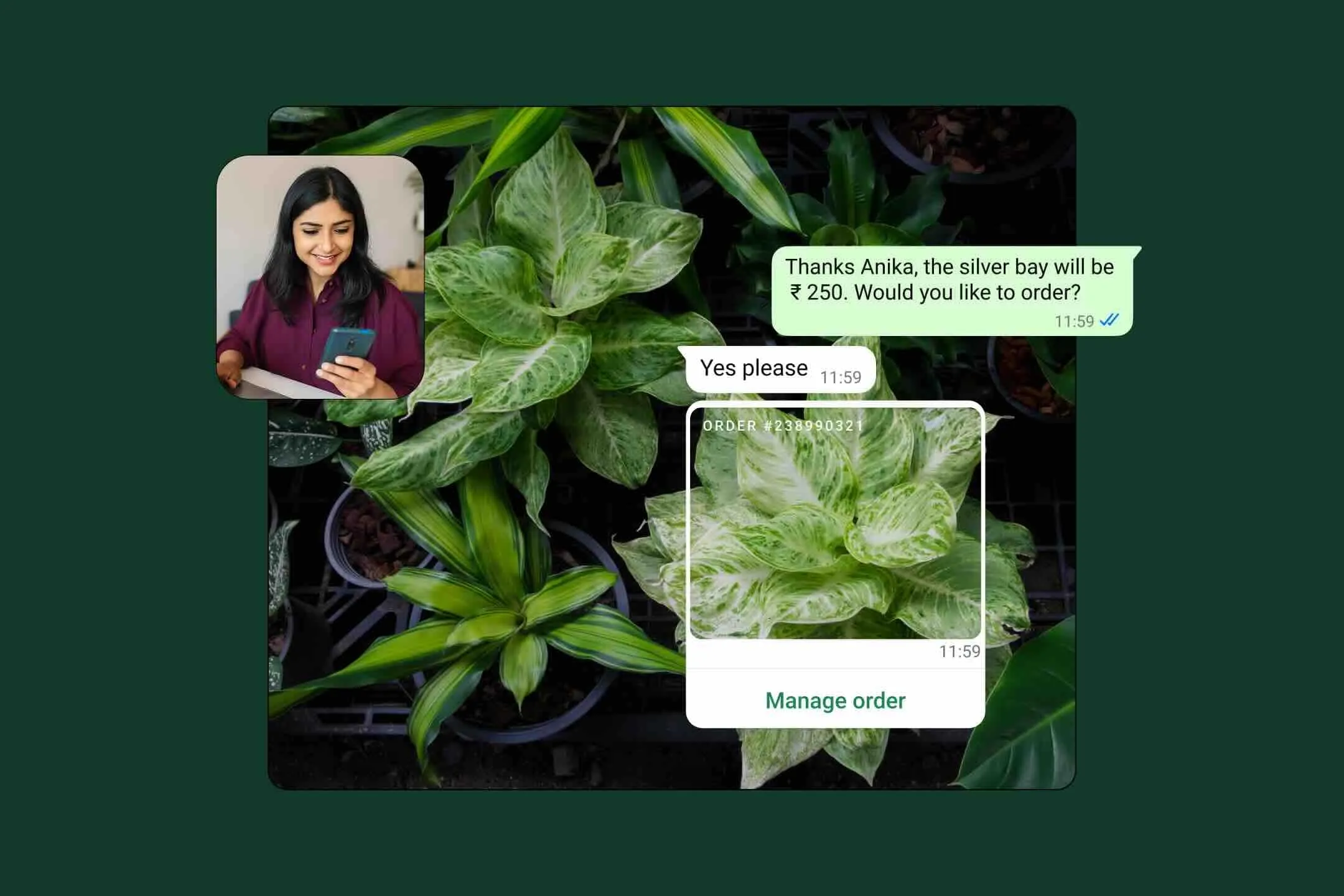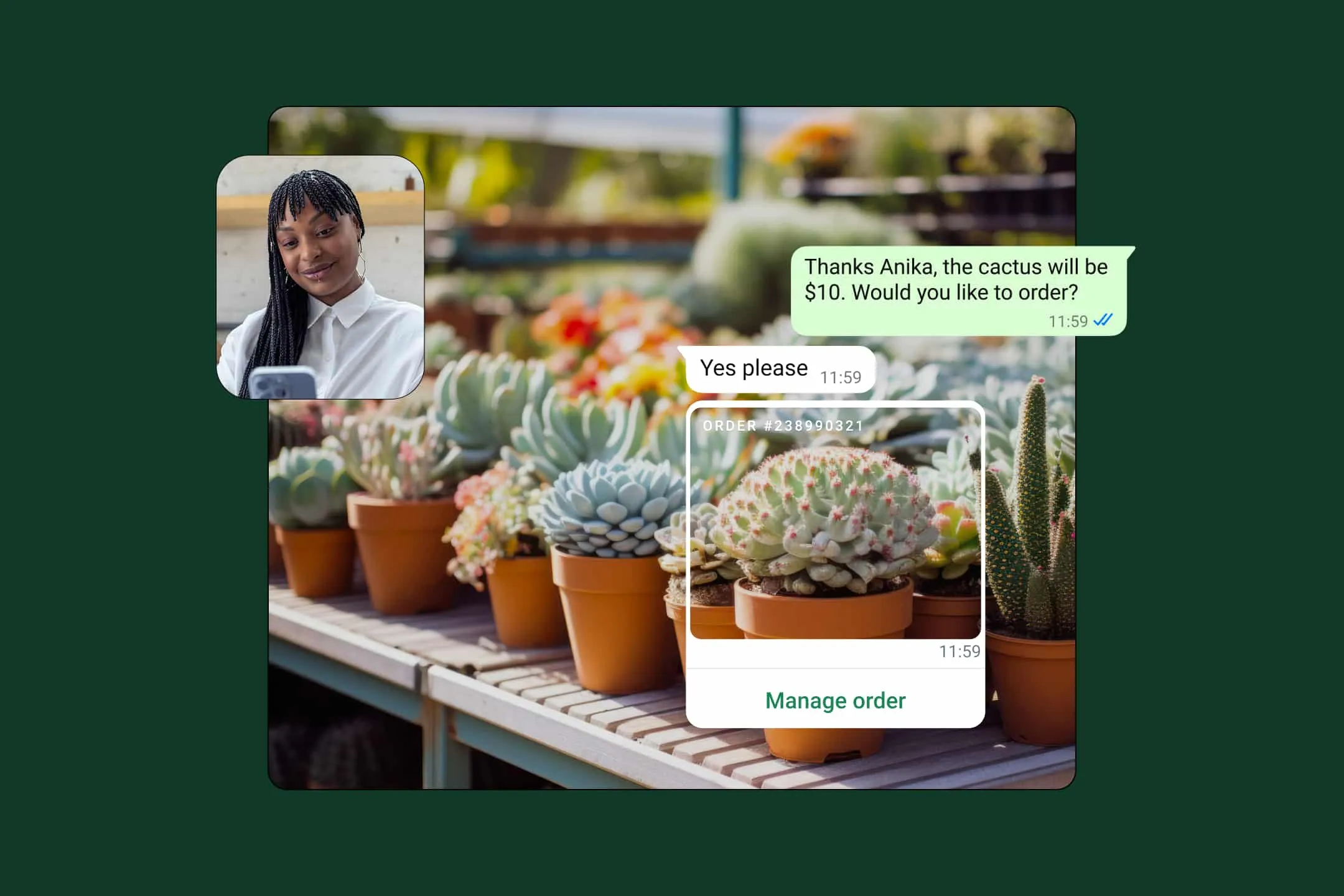Customers
What is B2C? Meaning, Examples & Marketing Strategies to Power Growth
|
July 15, 2025
Customers
|
July 15, 2025

Emerging during the dotcom era, B2C ecommerce helped transform the way businesses interact with customers. Since then, the B2C model seen in traditional retail stores has been applied to everything from online marketplaces to brand-specific mobile shopping apps. To define B2C, it's essential to understand the journey of B2C sales, distinguish it from B2B, and learn from the businesses shaping commerce today.
Let’s explore B2C examples of how enterprises, along with small businesses, use messaging and technology to meet ever-evolving consumer expectations.
B2C, or Business-to-Consumer, refers to the direct sale of products and services between businesses and consumers. There are three key characteristics of B2C sales that differentiate it from other forms of commerce. First, the target audience of B2C commerce is always individuals, rather than businesses or organizations. Second, products or services are purchased for personal consumption, instead of resale or business purposes. Finally, sales only occur between the business and the consumer, rather than through third parties.
Understanding B2C, meaning commercial strategies to engage individuals, can help businesses drive revenue and build loyalty. These businesses generally fall into the following B2C models:
B2B and B2C are common business terms that involve the selling of products and services. However, there are key differences between B2B and B2C that separate these selling models:
For example, WhatsApp for Business operates as a B2B platform offering B2C solutions that help businesses engage customers, accelerate sales and drive better customer support outcomes. In contrast, businesses that use WhatsApp often follow B2C models, selling products and services directly to consumers.
On WhatsApp, these interactions can include chat-based customer service, utility messages for customer notifications, personalized marketing messages and ads that click to Whatsapp. Understanding B2B vs. B2C marketing, customer support and sales models helps inform business approaches for a more robust, real-world strategy.
First, what is B2C marketing? B2C marketing strategies capture consumer attention to influence product or service consideration and encourage sales. These strategies can include: social media marketing on Facebook and Instagram, paid advertising on search engines and websites, content creation, commercials, product placement and more appeals to audience consideration.
Here’s an example use case: Telecommunications company Movistar traditionally reached out to existing customers in Argentina through door-to-door sales and telemarketing. However, by sending remarketing messages on WhatsApp, the company delivered customized offers that helped reduce customer acquisition costs by 70% and grow its WhatsApp sales share by 3X.
B2C ecommerce can occur online whenever a user makes a purchase, signs up for a service, or books an appointment via the internet. These online sales help provide businesses and consumers with the freedom to sell and purchase at any time.
Here’s an example use case: As a leading insurance marketplace, PolicyBazaar wanted to move beyond impersonal one-way communication and enable real-time customer conversations tailored to customer needs at scale. As part of that goal, the team built a user-friendly payment journey by adopting the Payments API for WhatsApp, providing customers with a seamless in-thread checkout and purchase, helping to reduce drop-off rates and increase conversion rates for policy renewals.

Abandoned cart recovery is a strategy that uses web or app analytics and automated messaging to re-engage customers who initiated a purchase without completing it. This form of remarketing involves sending reminders, offering incentives and delivering support in the checkout process.
Here’s an example use case: Faced with high cart abandonment rates, fashion and lifestyle retailer Lojas Renner needed a communications channel to deliver personalized messages to help rekindle customer interest. The company built an outbound marketing channel with WhatsApp, including a data-driven approach to cart recovery, resulting in a 70%+ read rate for customers in the WhatsApp channel.
Chat support allows businesses to have real-time conversations with customers to resolve issues through the convenience of messaging. Chat support can include live chats with human representatives or AI agents using natural language processing to pick up on context and tone, making even automated conversations feel more real and natural.
Here’s an example use case: Hong Kong-based Vita Green Group partnered with Omnichat to integrate the WhatsApp Business API for its marketing, sales and customer service teams. As a result, the company created a unified solution that delivered higher message click-through rates, more coupon redemptions and a more helpful customer experience.
For B2C commerce, personalization allows businesses to tailor campaigns according to customer segmentation, preferences, behaviors and lifestyles. Campaigns can be personalized using data such as purchase history, browsing behavior and demographics, which can help create a more valuable customer experience.
Here’s an example use case: Powerade partnered with the Brazilian Olympic Committee to develop a personalized Summer Games experience for fans. Through an immersive messaging campaign, fans could customize their experience through WhatsApp, from choosing their favorite sports and athletes to follow to sending and receiving messages from these athletes.The company promoted the experience with a campaign of ads that click to WhatsApp, driving tens of thousands of users to the experience while delivering a 6-point lift in ad recall and a 4.9-point lift in top of mind awareness.
By logging into apps and websites, people can gain access to personalized customer experiences through accounts with brands. Account authentication methods like OTPs or email and password combinations impact user identity protection and experience.
Here’s an example use case: Kopi Kenangan, one of Indonesia’s largest branded coffee chains, aimed to enhance user conversion rates and lower customer acquisition costs by replacing low-converting channels with promotional notifications. To achieve this, the team leveraged WhatsApp to deliver targeted customer offers via the company NXCLOUD. This integration enabled them to send authenticated messages on WhatsApp, streamlining the registration and login process for existing customers. As a result, the company achieved a 3X lift in conversions via promotional notifications in WhatsApp, compared to promotional notifications via traditional channels.

Order tracking is a key component of the ecommerce delivery process as it keeps customers informed about order status from purchase to delivery. Typically these are automated, real-time messages sent to customers via channels like messaging, email, SMS, WhatsApp or other methods.
Here’s an example use case: For SPL, a government-operated postal service in Saudi Arabia, ensuring the security and reliability of deliveries was key to their customer service experiences. In order to provide more effective customer service and accurate deliveries, SPL created a digital assistant on the WhatsApp Business Platform to reduce business costs and expand services. With WhatsApp, SPL successfully achieved a 50% reduction in call center wait times and 90% of customer inquiries were resolved within WhatsApp alone.
Data-driven marketing involves using relevant data insights to create marketing and messaging campaigns that reach customers where they are, with more relevant messaging and offers. This enables businesses to better understand customer behavior, personalize experiences and improve campaign performance.
Here’s an example use case: The Indonesian arm of Domino’s Pizza needed a way to convert new customers to loyal patrons, enhance customer engagement and drive more traffic to its app. They cultivated repeat customers by combining its customer relationship management (CRM) and customer lifecycle marketing (CLM) efforts with WhatsApp messages and campaigns, resulting in a 72% increase in sales.
Identity protections help ensure every user login or business transaction is authenticated. This authentication is a B2C example of how to help ensure trust between businesses and consumers. By implementing protection strategies like security codes, biometric scans and voice authentication, businesses help prevent adversaries from exploiting stolen user credentials or bypassing safeguards.
Here’s an example use case: Banorte, a financial institution, needed to secure customers' personal and financial information while making the validation process easier for older or disabled customers. To prevent identity theft, they integrated voice recognition software into WhatsApp. Voice recognition allowed pensioners to authenticate their identities remotely by repeating certain phrases recorded during a face-to-face meeting. As a result, customers felt confident that transactions were secure and interactions over WhatsApp increased by 220%.
Customer self-service is the process of empowering customers to resolve questions and issues on their own. Self-service can help relieve business support teams and reduce customer wait times for representative responses. This option can be crucial as modern consumers likely desire speed, convenience and a seamless checkout experience.
Here’s an example use case: Brazilian lender Consórcio Magalu wanted to automate their booking system process entirely through WhatsApp to minimize dropoff, reduce customer wait times and curb the need for agent intervention. The company used WhatsApp Flows to redesign its scheduling experience for potential clients, resulting in 2.9X more conversions than its usual approach.
Influencer sponsorships in B2C advertising are paid partnerships between brands and social media content creators that create content featuring the brand. This content appears more authentic than traditional ads since it comes from a trusted voice the audience already follows.
Here’s an example use case: An influencer with millions of followers on Instagram features facial products in her morning routine. A skincare business reaches out to the influencer because its audience is women within her age group who are interested in affordable skincare (the company’s key demographic). The influencer agrees to a contract with the business, and creates ad content that generates more engagement for the company than ever before, while driving to chat about the product through ads that click to WhatsApp.

Technology helps to scale B2C commerce by providing businesses with more diverse, personalized and convenient ways to reach customers and provide them access to their products. WhatsApp for Business offers businesses of different sizes two distinct ways to accomplish these goals: through the WhatsApp Business app and the WhatsApp Business Platform.
Small-to-medium sized business teams rely on applications to connect people with the information, product and services they need, from their devices at any time. This environment fosters better customer relationships and can be scalable to meet growing business demands.
Since billions of people already use WhatsApp for personal communications, WhatsApp Business app features allow companies to engage with customers on a platform they’re already familiar with, making interactions seamless and convenient.
When it comes to enterprise B2C technology, Application Programming Interfaces (APIs) act as a bridge between platforms, allowing for seamless connectivity and data integrations.
WhatsApp Business Platform features are built for larger companies seeking powerful messaging capabilities that integrate with other systems. Businesses can access WhatsApp Business Platform APIs through Business Messaging Partners that have the expertise and technical capability to integrate with sophisticated technology stacks.
B2C marketing and sales efforts help businesses create better connections and build customer loyalty. Technology plays an important role in scaling these efforts through efficient customer service, secure transactions and timely notifications. Successful B2C companies are able to leverage data and digital tools to create seamless, personalized customer journeys that lead to better relationships and business growth.
Ready to get started? Whether you’re an enterprise or a one-person shop, WhatsApp for Business solutions can help realize the full potential of customer conversations to drive measurable growth and success.
*Source: Meta internal data, January 23-February 21, 2025.
**Source: Meta internal data, January 23-February 19, 2025.
B2C sales refer to the process in which businesses sell products or services directly to individual consumers for personal use. These sales focus on engaging consumers through emotional connections, brand loyalty and straightforward purchasing decisions, often with shorter sales cycles.
B2C involves selling directly to individual consumers, emphasizing emotional appeal and quick buying decisions. In contrast, B2B (Business-to-Business) sales target other businesses, focusing on ROI and value, and often involve longer, more complex sales cycles with multiple decisionmakers. B2B transactions involve business-related decision making, product customizations and contractual agreements.